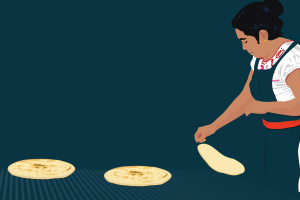
Food Fortification
Micronutrients are essential vitamins and minerals that people need to develop and maintain good health. While the best way to prevent micronutrient deficiencies is to maintain a diverse and healthy diet, nutritious foods are not always accessible or affordable to all, particularly most vulnerable groups. In fact, more than two billion people globally suffer from deficiencies of micronutrients such as iron, iodine, folic acid and vitamin A, causing serious health and economic impacts.
Our campaign takes a closer look at a complementary solution: food fortification – the addition of micronutrients to foods to correct or prevent deficiencies and improve public health. An intervention available to the food industry that could save millions of lives if done well, poor governmental oversight often results in a majority of food products not being adequately fortified even where national legislation exists. Furthermore, media reports highlight how some players in the food industry purposefully under-fortify foods to gain commercial advantage over their competitors.
Spotlight

Sorting the Wheat from the Chaff: Food Fortification in Mexico
Reports

Corn Fakes: The social and economic costs of the removal of micronutrients from Kellogg’s cereals
This report reveals the cereal-giant Kellogg's has continued to remove micronutrients from its cereal in 2019, and goes further to estimate its savings from this practice and the cumulative costs to Mexican ...

Maizena’s missing micronutrients
This report looks at Unilever’s voluntary initiative on fortification in Mexico, and reveals a glaring lack of consistency between the company’s commitments and its business practice when it comes to fortifi...

Daily Bread: Are tortillas and breads in Mexico adequately fortified?
This report explores the issue of flour fortification in Mexico, revealing that companies that make tortillas and breads are often not using flour that complies with the law.

Cereal offender: is Kellogg’s breaking its breakfast promises?
This report looks at the behaviour of Kellogg’s, the leading company in terms of breakfast cereal sales in Mexico, where micronutrient deficiencies are a major public health problem including amongst children.

The grain of truth: industry compliance on flour fortification in Mexico
This report calls on the new government in Mexico to take a fresh look at the actions of the food industry and take corrective action to guarantee that Mexican people have access to essential nutrients throu...

Sorting the Wheat from the Chaff: Food Fortification in Mexico
In this report, we delve deeper into the issue of food fortification in Mexico, a country with a double burden of malnutrition. While Mexico has one of the highest obesity rates in the world, certain micronu...

Micronutrient deficiencies in Mexico: Ironing out the kinks
This briefing looks into the issue of flour fortification in Mexico, specifically at whether flour companies are following the recommendations on the most effective iron sources.